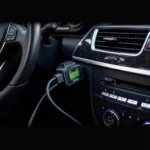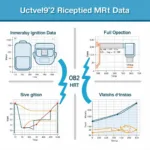OBD2 pocketscan codes are standardized alphanumeric codes that provide insights into the health and performance of your vehicle. Think of them as your car’s way of communicating with you, a secret language that a pocket OBD2 scanner can decipher, revealing potential issues that need attention.
What are OBD2 Pocketscan Codes?
When your car’s onboard computer (ECU) detects a problem, it logs a specific code in its memory. This code, known as an OBD2 code, corresponds to a particular issue or malfunction within a specific system. An OBD2 pocketscan, a small, portable device that plugs into your vehicle’s OBD2 port, reads these codes and displays them on its screen.
Why are OBD2 Pocketscan Codes Important?
Understanding OBD2 pocketscan codes empowers you with valuable information about your vehicle’s health. Instead of relying solely on mechanics for diagnosis, you can use a pocketscan to:
- Identify potential issues early on: OBD2 codes often appear before noticeable symptoms arise, allowing for proactive maintenance and potentially preventing costly repairs.
- Gain a better understanding of your car: Knowing the meaning behind the codes helps you understand your vehicle’s inner workings and address issues efficiently.
- Communicate effectively with mechanics: Arriving at a repair shop with a list of OBD2 codes provides mechanics with a starting point for diagnosis, saving time and potentially reducing diagnostic costs.
Types of OBD2 Pocketscan Codes
OBD2 codes follow a standardized format, typically starting with a letter and followed by four digits:
- P Codes: Powertrain codes relate to the engine, transmission, and emissions systems.
- B Codes: Body codes are associated with components like airbags, power windows, and central locking.
- C Codes: Chassis codes indicate problems with the anti-lock braking system (ABS), traction control, and suspension.
- U Codes: Network and communication codes relate to issues within the vehicle’s communication network, such as those between different modules.
Deciphering OBD2 Pocketscan Codes
While a pocketscan retrieves the codes, understanding their meaning requires a reference guide or online resource. Websites like OBDFree provide comprehensive databases of OBD2 codes, along with detailed explanations of their potential causes and troubleshooting tips.
For example, the code “P0302” indicates a misfire detected in cylinder 2. This information guides you towards potential causes like faulty spark plugs, ignition coils, or fuel injectors in that specific cylinder.
Choosing the Right OBD2 Pocketscan
With a wide range of OBD2 pocketscans available, selecting the right one depends on your needs and budget. Some factors to consider include:
- Functionality: Basic scanners read and clear codes, while advanced models offer live data streaming, graphing capabilities, and manufacturer-specific code definitions.
- Compatibility: Ensure the scanner is compatible with your vehicle’s make, model, and year.
- Ease of Use: Look for scanners with intuitive interfaces, clear displays, and user-friendly software.
You can find detailed reviews and comparisons of various OBD2 scanners, including the Actron OBD2 & ABS scanner, on websites like OBDFree.
Common OBD2 Pocketscan Codes and Their Meanings
Here are some frequently encountered OBD2 pocketscan codes:
- P0420: Catalyst System Efficiency Below Threshold (Bank 1)
- P0171: System Too Lean (Bank 1)
- P0300: Random/Multiple Cylinder Misfire Detected
- P0101: Mass Air Flow (MAF) Sensor Performance Problem
For a comprehensive list of codes for obd2 pocketscan, you can refer to our detailed guide.
Tips for Using OBD2 Pocketscans Effectively
- Clear codes after repairs: After addressing a code, clear it to confirm the fix and reset the check engine light.
- Note down codes and freeze frame data: Record the codes and the associated freeze frame data, which provides a snapshot of the engine’s parameters at the time the code was set. This information can be valuable for diagnosis.
- Consult reputable sources for code interpretation: Use reliable online resources or consult with experienced mechanics to ensure accurate code interpretation.
Conclusion
OBD2 pocketscan codes are invaluable tools for vehicle owners, providing insights into potential issues and empowering them with knowledge about their cars. By understanding these codes and utilizing a reliable OBD2 pocketscan, you can maintain your vehicle proactively, potentially saving money and ensuring a smoother driving experience.
Need help with your OBD2 codes? Contact us on WhatsApp: +1(641)206-8880, or email us at [email protected]. We offer 24/7 customer support to assist you with all your car diagnostic needs.

